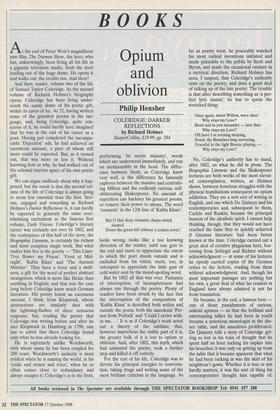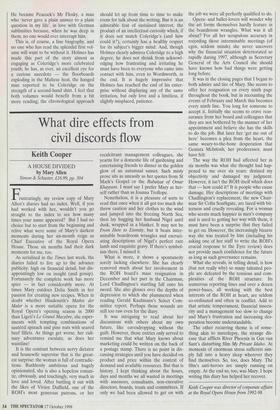BOOKS
Opium and oblivion
Philip Hensher
COLERIDGE: DARKER REFLECTIONS by Richard Holmes HarperCollins, £19.99, pp. 584 At the end of Peter Weir's magnificent new film, The Truman Show, the hero, who has, unknowingly, been living all his life in a gigantic television studio, finds the door leading out of the huge dome. He opens it and walks out; the credits run. And then?
And then, reader, volume two of the life of Samuel Taylor Coleridge. As the second volume of Richard Holmes's biography opens, Coleridge has been living under- neath the sunny dome of his poetic gift, within its caves of ice. At 32, having written some of the grandest poems in the lan- guage, and, being Coleridge, quite con- scious of it, he could hardly have imagined that he was at the end of his career as a poet. Having just completed the incompa- rable 'Dejection' ode, he had achieved an enormous amount, a poet of whom still more could be expected. But, as it turned out, that was more or less it. Without knowing how or why, he had walked out of the colossal interior space of his own poetic gift.
We can argue endlessly about why it hap- pened, but the result is that the second vol- ume of the life of Coleridge is always going to seem less essential than the first. Seri- ous, engaged and rewarding as Richard Holmes's Darker Reflections is, it can hardly be expected to generate the same over- whelming excitement as the famous first volume, Early Visions. Coleridge's literary career was certainly not over by 1802, and the centrepiece of this half of the story, the Biographia Literaria, is certainly his richest and most complete single work. But what makes him live is the poetry — 'This Lime- Tree Bower my Prison', 'Frost at Mid- night', `Kubla Khan' and 'The Ancient Mariner'. They have a force and a swift- ness, a gift for the word of perfect abstract strangeness, which is more like Heine than anything in English; and that was the case long before Coleridge knew much German literature. His poetry learnt an enormous amount, I think, from Klopstock, whose abstractions are similarly shot with the lightning-flashes of sheer sensuous response; but, reading the poetry that Coleridge was writing before and after he met Klopstock in Hamburg in 1798, one has to admit that there Coleridge found only what he was already looking for.
He is supremely unlike Wordsworth, with whose name he has been coupled for 200 years. Wordsworth's audacity is most evident when he is naming the world, in his `rocks and stones and trees', when he so often comes close to redundancy and always escapes it; Coleridge's is in the frost, performing 'its secret ministry', words which are understood immediately, and run on inexhaustibly in the head. The differ- ence between them, as Coleridge knew very well, is the difference he famously explores between the massive and centralis- ing Milton and the endlessly curious, self- obliterating Shakespeare. No amount of repetition can hackney his greatest poems, or remove their power to amaze. The word `romantic' in the 12th line of `Kubla Khan':
But 0 that deep romantic chasm which slanted Down the green hill athwart a cedarn cover!
looks wrong, looks like a too knowing direction of the reader, until one gets to the end and starts to appreciate the extent to which the poet stands outside and is excluded from his vision; starts, too, in retrospect to appreciate the little gust of cold water sent by the mood-spoiling word.
But by 1802 all that was over. Fantasies of interruption, of incompleteness had always run through the poetry. Plenty of readers have been struck by the fact that the interruption of the composition of `Kubla Khan' is described both within and outside the poem, both the anecdotal 'Per- son from Porlock' and 'Could I revive with- in me. . .' It is as if Coleridge's work acted out a theory of the sublime; that, however marvellous the visible part of it is, the greater bulk of it is lost to opium or oblivion. And, after 1802, this myth, which had animated the poetry, took a further step and killed it off entirely.
For the rest of his life, Coleridge was to devote his principal energies to conversa- tion, taking drugs and writing some of the most brilliant criticism in the language. As far as poetry went, he peaceably watched his most radical inventions imitated and made palatable to the public by Scott and Byron, and made the occasional venture in a metrical direction. Richard Holmes has seen, I suspect, that Coleridge's authority rests on the poetry, and does a good deal of talking up of the late poetry. The trouble is that after describing something as 'a per- fect lyric stanza', he has to quote the wretched thing: Once again, sweet Willow, wave thee! Why stays my Love?
Bend and in yon streamlet — lave thee Why stays my Love?
Oft have I at evening straying, Stood, thy Branches long surveying, Graceful in the light Breeze playing, Why stays my Love?
No, Coleridge's authority has to stand, after 1802, on what he did in prose. The Biographia Literaria and the Shakespeare lectures are both works of the most elevat- ed contemplation, written, as Holmes shows, between ferocious struggles with the physical humiliations consequent on opium addiction. They are a new sort of writing in English, and one which De Quincey and his contemporaries and, subsequent to them, Carlyle and Ruskin, became the principal bearers of the idealistic spirit. I cannot help thinking, though, that they would not have reached the fame they so quickly achieved if German literature had been better known at the time. Coleridge carried out a great deal of creative plagiarism here, bor- rowing from Schlegel and Richter without acknowledgment — at some of his lectures he openly carried copies of the German critics to the lectern, reading from them without acknowledgment. And, though his most important passages are nothing but his own, a great deal of what his readers in England have always admired is not far from translation.
He became, in the end, a famous bore one of those punishments of curious, unkind aptness — so that the brilliant and entertaining talker he had been in youth became a notorious monologist at the din- ner table, and the anecdotes proliferated. De Quincey tells a story of Coleridge get- ting so lost in his train of thought that he spent half an hour tucking his napkin into his breeches; it was only on getting up from the table that it became apparent that what he had been tucking in was the skirt of his neighbour's gown. Whether it is true or not hardly matters; it was the sort of thing his contemporaries thought him capable of. He became Peacock's Mr Flosky, a man who 'never gave a plain answer to a plain question in my life', in love with German sublimities because, when he was deep in them, no one would ever interrupt him.
This is, of course, a fine biography, and no one who has read the splendid first vol- ume will want to be without it. Holmes has made this part of the story almost as engaging as Coleridge's more celebrated youth; he has, as ever, an excellent eye for a curious anecdote — the floorboards exploding in the Maltese heat, the hanged man reported to be Coleridge on the strength of a second-hand shirt. I feel that both volumes would benefit from a bit more reading; the chronological approach should let up from time to time to make room for talk about the writing. But it is an admirable feat of sustained interest, the product of an intellectual curiosity which, if it does not match Coleridge's (and how could it?), certainly has a healthy respect for its subject's bigger mind. And, though Holmes clearly admires Coleridge to a high degree, he does not shrink from acknowl- edging how frustrating and irritating he must have been to everyone who came into contact with him, even to Wordsworth, in the end. It is hugely impressive that Holmes has reached the end of his enter- prise without displaying any of the same irritation, but only love and a limitless, if slightly misplaced, patience.











































































 Previous page
Previous page